A guide to the culinary breakthroughs, cult brands, fonts of fat, sandwich fillings, burger simulacra, pizza cheeses, pioneers, and condiments.
Mankind has, of course, abstained from consuming animal products for centuries, for reasons mostly grounded in animal-rights ideology, like Watson’s, and religious strictures, from Jainism to Rastafarianism. And the medical consensus is that eating less meat and more plants leads to lower rates of deadly diseases (although debate persists about whether a strictly vegan diet — absent all animal products, including dairy and eggs — can provide all the necessary nutrients without supplementation). But whether you consider veganism a movement, belief system, or fad diet right up there (or down there) with Paleo and gluten-free, there’s no denying we have reached a critical moment in its evolution. According to market-research company GlobalData, 6 percent of Americans claim to be vegan, compared to one percent in 2014, an increase of 500 percent. “Plant-based” restaurants are springing up all over town, with plant being a relative term. Vegan Misconception No. 1: Vegan equals health food. Many ethical vegans seem content to subsist on highly processed facsimiles of meat, chicken, and fish, sculpted from soy protein or wheat gluten, often deep-fried and accompanied by a pile of inherently vegan fries.
And speaking of simulacra, the food-tech world is not only engaged in a beefless-burger arms race but on a mission to replicate the entire animal kingdom with little more than pea protein, algae, and the lab-grown fermented yeast protein called heme. The goal is to create a sustainable food supply for a resource-challenged future, and the intended market is not self-identifying vegans but the entire omnivorous world.
If all this sounds somewhat unappetizing, just remember that science and food have always been intertwined. Is there really much difference between Ocean Hugger Foods’ new tomato-based “ahi tuna” and some of Wylie Dufresne’s trompe l’oeil brainstorms?
It’s easy to write off vegan food as quote food: “ham” and “cheese” analogues slapped together with cruelty-free “mayo.” But beyond the big business and the junk food, beyond new vegan burgers that “bleed” and vegan cheeses that melt, there are skilled vegetable chefs producing delicious real food, a fact that’s sometimes lost on non-vegans who find the animal-free kingdom insular and a bit mysterious. So here’s our guide to navigating an increasingly plant-based world, whether you’re a vegan, a would-be vegan, or just a curious omnivore.
A
Aquafaba
It’s hard to say what’s made more of a culinary impact: man’s harnessing of fire or vegans’ discovery that canned-chickpea liquid whips up into a substance so akin to eggs it’s revolutionized everything from meringues to mayo. (The name, taken from the Latin for water and bean, was coined by Indiana software engineer and food blogger Goose Wohlt.)
B
BjornQorn
Smarter smart food.
Why has BjornQorn become the movement’s official popcorn? The guys who make it, who met in school at Bard, pop it with solar power and flavor it not with cheese but with nutritional yeast. (See “Nooch.”)
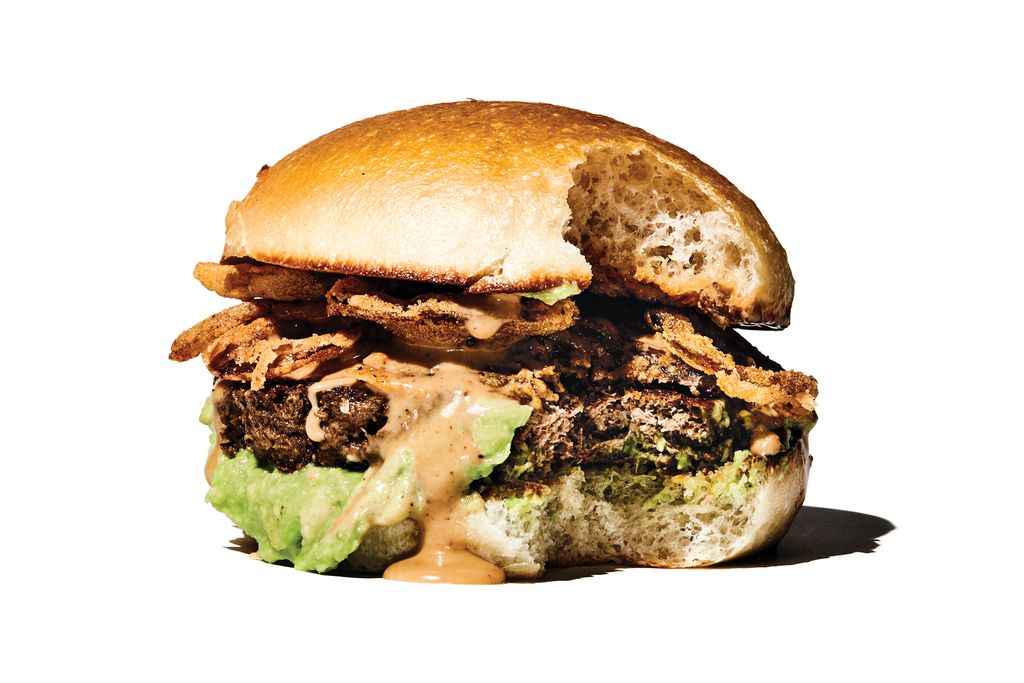
Burgers, Impossible
The entire field, ranked.
Who knew there were only seven restaurants in New York currently permitted by the Silicon Valley company Impossible Foods to sell its Impossible Burger, the revolutionary ground meat made from wheat, potatoes, coconut oil, and fermented yeast that bleeds when you cook it? Most of these burger joints’ default Impossible Burger is vegetarian, but six of them will veganize it for you. We set out to try them all and made some general observations along the way: An Impossible Burger patty in and of itself is good, not great. It comes closer to replicating the real thing than any other meat analogue we’ve ever tried (see “Meats, Mock”). And the meat has a knack for forming a thin, crisp, even crust. But it also has a mushy mouthfeel, a slightly unpleasant aftertaste, and lacks the heft and complex flavor of real beef. Close but no cigar about sums it up. In any event, whether it be made of beef or coconut oil and fermented yeast, there’s more to a good burger than the patty. Here’s how these veganized Impossible Burgers rate.
1. Momofuku Nishi
232 Eighth Ave.; $18, including fried potatoes
As it is with regular beef burgers, there are two schools of thought regarding vegan-burger construction: You go minimalist and let the meat speak for itself. Or you load it up with flavor enhancers and think of the meat as a condiment. Momofuku Nishi represents both schools. You can veganize the restaurant’s vegetarian Impossible Burger by skipping the smoked Gouda but leaving the rest: four-ounce patty cooked medium-rare, vegan truffle mayo, good pickle slices, Pain D’Avignon bun. Or you can live it up and order the vegan Stackhouse (avocado, onion rings crisped with a coconut-milk batter, and a housemade vegan ranch dressing). Both are nicely proportioned, soundly constructed, and surprisingly satisfying. Our two-person tasting panel was split over which was better but liked these burgers more than any others we tried. So, for crackerjack burger technique and the extra-vegan option, Nishi is our pick for the best vegan Impossible Burger in town.
2. Saxon + Parole
316 Bowery; $20
This is the Impossible Burger in gourmet-pub-burger mode, a two-fisted dynamo built along the lines of a Macy’s parade balloon. If this burger were in the market for a cheap suit, it would go to Rochester Big & Tall. It comes on a puffy housemade “everything” bun, dressed with mushroom purée, poblano salsa, and half an avocado fanned out across the top. None of these umami boosters masks the flavor of the fake meat — good, salty, faintly beefy, with the best crust of the lot.
3. Umami Burger
Multiple locations; $16
The bad news: The “Umami Master Sauce” and “Umami Dust” they use on all the burgers including this double-patty Impossible version contain non-vegan flavor enhancers, and the Portuguese bun is made with milk. The good news: The kitchen will veganize it (the burger, not the bun). More bad news: Veganized in this case means bunless and sandwiched between lettuce leaves. The surprisingly great news: It’s delicious and about as easy to eat as a cucumber sandwich, owing to the fact that some of the condiments — tomato, avocado, miso mustard, pickles, and caramelized onion — are strategically nestled between the patties so that nothing squirts out onto your lap. In sum, we’ve never had a better fake-beef double burger on a roll made out of lettuce.
4. Bareburger
Multiple locations; $16
You build your own from a menu column listing various breads, cheeses, and condiments, with a handful of vegan options. And under the heading “choose your bun,” along with non-vegan brioche and a gluten-free choice, you’ll find the “collard green wrap.” Call us derelict in our duty, but we couldn’t bring ourselves to try an Impossible Burger wrapped up like a burrito in collard greens. We went with the vegan sprout roll that looked like something you’d find in an old hippie health-food shop with vegan Cheddar, smoke sauce, and jalapeños. The patty was bigger than Nishi’s but smaller than Saxon + Parole’s. And it seemed more loosely packed and subject to disintegration than the others we tried. Still, it hit the spot.
5. The Counter Custom Burgers
7 Times Square; $15
Everything about this tourist-happy Times Square branch of a California-based burger chain is a pleasant surprise, especially the super-friendly service that in a hospitality throwdown would make Danny Meyer look like Al Yeganeh the Soup Nazi. The burger was impressive, too — big and beefy, slightly overcooked but juicy, and served on what our waiter insisted was a vegan brioche bun.
6. Bill’s Bar & Burger
16 W. 51st St.
It may be that Bill’s has never served a veganized Impossible Burger. The request caused a minor stir. Several of the staff we spoke with seemed baffled by the idea, as if they had never heard of this crazy thing called veganism. A vegan bartender came to the rescue, and though the kitchen made a valiant effort, it’s enough to say that the burger was seared on one side only, dry as a Donald Trump beefsteak, and undone by an overbearing multigrain bun.
C
Cauliflower
Vegetable most likely to be mistaken for a piece of meat.
The phrase “cauliflower steak” kind of says it all: No vegetable is more suitable to meat substitution in restaurants vegan and otherwise. Find it deep-fried (of course) in the po’ boy at Champs Diner in East Williamsburg, presented as a whole imposing roasted head at Flatiron’s abcV, and impersonating wings that might be better than the chicken variety at Modern Love in Williamsburg. And at Taïm’s Nolita branch, Einat Admony has just unleashed a cauliflower shawarma, garnished with hummus, cabbage, tahini, and amba. But if we had to choose a single vegan sandwich for our proverbial desert-island shipwreck stay, it would be the sensationally meaty roasted cauliflower slathered with walnut pesto on sourdough slices from Breads Bakery. With cauliflower around, you wonder how the mock-meat business stays afloat.

Champs, Inc.
Ten years in the making of a Brooklyn vegan empire.
If North Brooklyn is increasingly becoming known for its vegan cheesesteaks, “pepperoni” slices, and eggless, dairyless desserts, you can thank Champs Diner’sBrad Baker, who, along with his crew and some former employees who’ve launched their own like-minded businesses, has been spreading the cruelty-free gospel for a decade. A timeline:
2008: Baker opens Boneshakers, a cycling-themed vegan sandwich and coffee shop in Greenpoint, which closes in 2010.
2010: Baker opens Champs Family Bakery in Williamsburg. Soon after, it morphs into Champs Diner, serving a full menu of veganized American comfort food.
2013: Baker opens diner outpost Champs Junior in Greenpoint.
2014: Having outgrown the old diner space and in hopes of procuring a liquor license, Baker relocates to East Williamsburg.
2014: Baker opens a wholesale bakery and café in Bushwick; it closes in 2015, and is taken over by former Champs head baker Preesa Adeline Bullington, who reopens it as Brooklyn Whiskers, a vegan bakery-café that has since expanded to Greenpoint.
2015: Baker converts the original diner space into Haymaker’s Corner Store, a vegan grocery and deli.
2015: Former Champs floor manager Jillian Camera co-opens Toad Style, a vegan restaurant and sandwich shop in Bedford-Stuyvesant.
2016: In partnership with Philadelphia’s Blackbird Pizzeria, Baker converts Champs Junior into Screamer’s, New York’s first completely vegan slice joint.
2018: Baker hopes to open a new Screamer’s near Prospect Park by next spring.
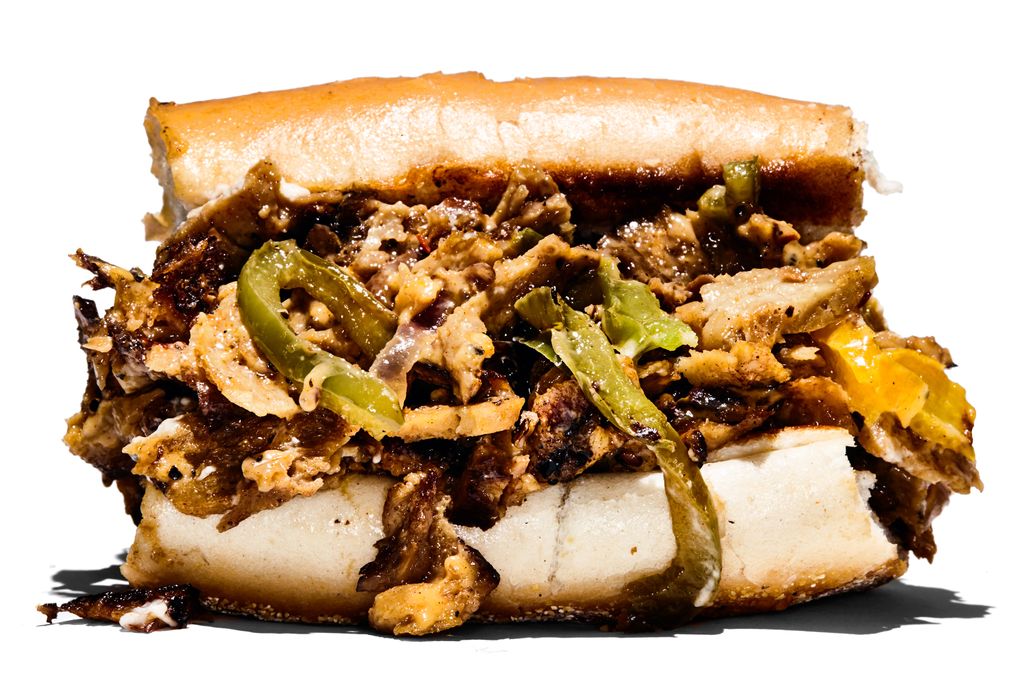
Cheese, Nut
Not all vegan cheese is meant to top pizza or nachos. A growing number of small artisanal producers are applying traditional cheesemaking techniques like culturing and aging to nut milks (cashew is king) to impart flavor complexity heretofore lacking. The trick to enjoying these faux fromages is to remember that, in many cases, they’re not intended to replicate any particular classic dairy cheese but crafted to be considered on their own unique merits. Here, the three best out of about a dozen we tried.
Cashew Blue-Green Algae, Beets, and Turmeric, Dr-Cow
Striking three-toned good looks (the spumoni of vegan cheese), with a rich and tangy flavor and a smooth texture not unlike a less dense terrine of foie gras. It’s made in Williamsburg by an Argentine hippie philosopher named Pablo Castro who sells retail out of the front of his factory. ($13.75 for four ounces, at Dr-Cow; 93 S. 6th St., Williamsburg)
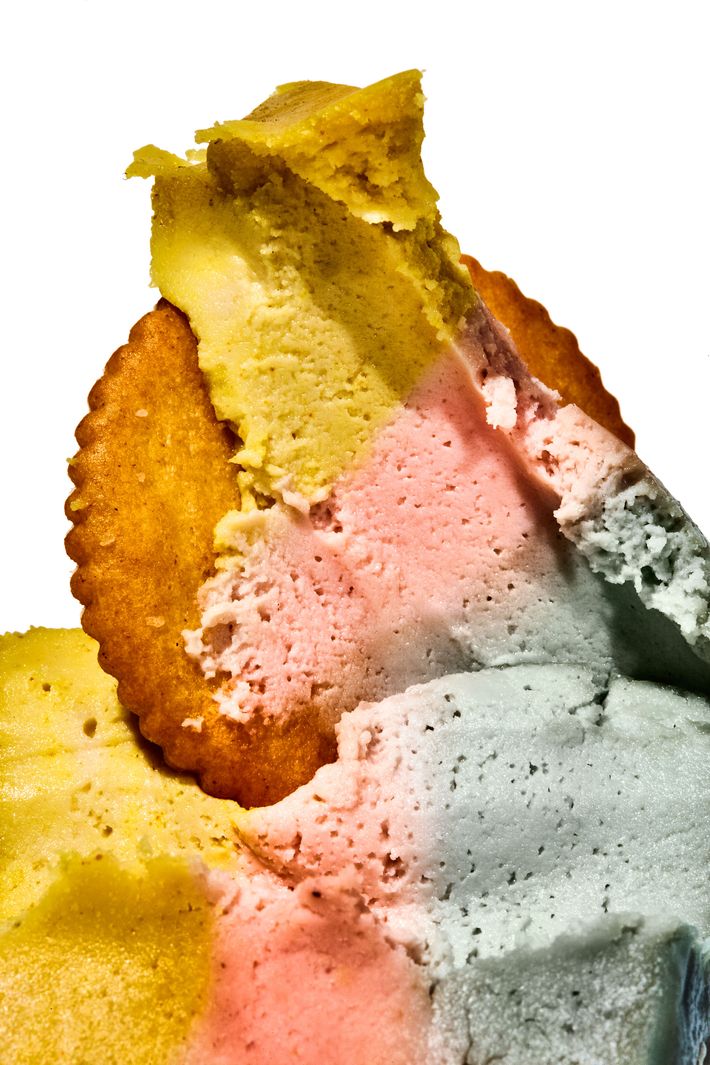
Cashew of the Woods Nut-Milk Cheese, Punk Rawk Labs
As the name suggests, this is flavored with ’shrooms (shiitake, cremini, and button), and truffle salt. It’s bright and peppery, with a nice note of fermented funk, and made by three women in Minneapolis: a scientist who moonlights as a raw-food chef, a record-shop owner, and a nutritionist. ($12.50 for 4.25 ounces, at Orchard Grocer; 78 Orchard St.)
Mt. Vesuvius Black Ash, Miyoko’s Kitchen
From the outside, this nut cheese (produced by one of the segment’s pioneers, Fairfax, California–based Miyoko Schinner) looks like an oversize Mallomar, but it doesn’t taste like it. Sharp and salty with the pronounced tang of an aged goat cheese, and firmer in texture than most. Chickpea miso and koji spores are the secret flavor enhancers. ($13.50 for 6.25 ounces, at Riverdel, 820 Washington Ave., Prospect Heights)
Coconut, Multitasking
Without coconuts, could there be veganism? The tropical drupe seems ever present on vegan menus and ingredient lists, with myriad uses for the meat-free, dairy-free, egg-free cook:
Oil: Low in essential fatty acids, high in saturated fat (more than butter!), this once-maligned, now-glorified product is best in smallish doses. Commonly found in vegan snacks and pizza cheese. (See “Pizza.”)
Milk: The result of blending coconut meat and water, then straining. Good for curries; not so great with cereal.
Yogurt: Rapidly expanding alt-dairy category; Anita’s is a popular, easy-to-find locally made brand.
Butter: Made by processing dried coconut flakes. Find it in health-food stores next to the nut butters.
Sugar: Evaporated nectar of the coconut palm’s flowers. Minimally processed but still sugar. Found in vegan chocolate.
Whip: Dessert topping, made by whipping and sweetening coconut cream. Found on top of vegan ice-cream sundaes and in canisters on store shelves.
Coffee Shop
Minus the cow milk.
By now, an alt-milk or two is de rigueur wherever third-wave coffee is sold. But at The Good Sort in Chinatown, there is no dairy to be had at all with your matcha, beetroot, or activated-charcoal latte — only coconut, almond, or oat milk. Is this the end of the skinny latte?
D
DeRossi, Ravi
The animal-loving nightlife maven.
You might not even be aware of the intersection between craft cocktails and vegan food, but Ravi DeRossi would like to corner the market on it. After making his name with a group of cocktail lounges, mostly clustered in the East Village, DeRossi has embarked on a well-publicized mission (reportedly inspired by the death of a cherished cat) to veganize the menus of all his establishments. So far, he’s made it to three: Ladybird, DeRossi’s “vegetable bar” reinvention of his fondue-happy Bourgeois Pig; the tiki-themed Mother of Pearl; and Cienfuegos, its rum-centric upstairs neighbor. But most of the impresario’s vegan cred derives from his full-fledged restaurant, Avant Garden, which showcases vegetables rather than meat substitutes, and pairs them not with cocktails but with natural wines.
E
Establishment
Old-school restaurants.
Before there were celebrity vegan chefs like Matthew Kenney and Tal Ronnen, there was Angelica Kitchen, which opened on St. Marks Place as a macrobiotic restaurant around 1976. Leslie McEachern took over in ’82, eventually relocating it four blocks north and finally closing it in April. Unlike A.K. — home of the beloved Dragon Bowl — these other, still-thriving forefathers of the modern vegan movement have been careful not to put all their egg substitutes in one basket.
Candle Cafe
Born in 1984 as the Healthy Candle, this onetime Upper East Side juice bar morphed into the Candle Cafe and expanded with Candle 79 and Candle Cafe West. Signature dish: seitan skewers.
Blossom
The 2005 Chelsea original begat an Upper West Side outpost, then loosely affiliated quick-service chainlet Blossom du Jour, the chocolate shop and bakery Cocoa V, and southern-inspired Urban Vegan Kitchen. Signature dish: seitan scaloppine.
F
Fats, Ubiquitous
A perennial criticism of the vegan diet is the perceived lack of protein. It’s good on fats, though, including cashew cream, almond butter, coconut milk, margarine, and various oils, without which we wouldn’t have vegan brownies and doughnuts. (See “Sweets.”)
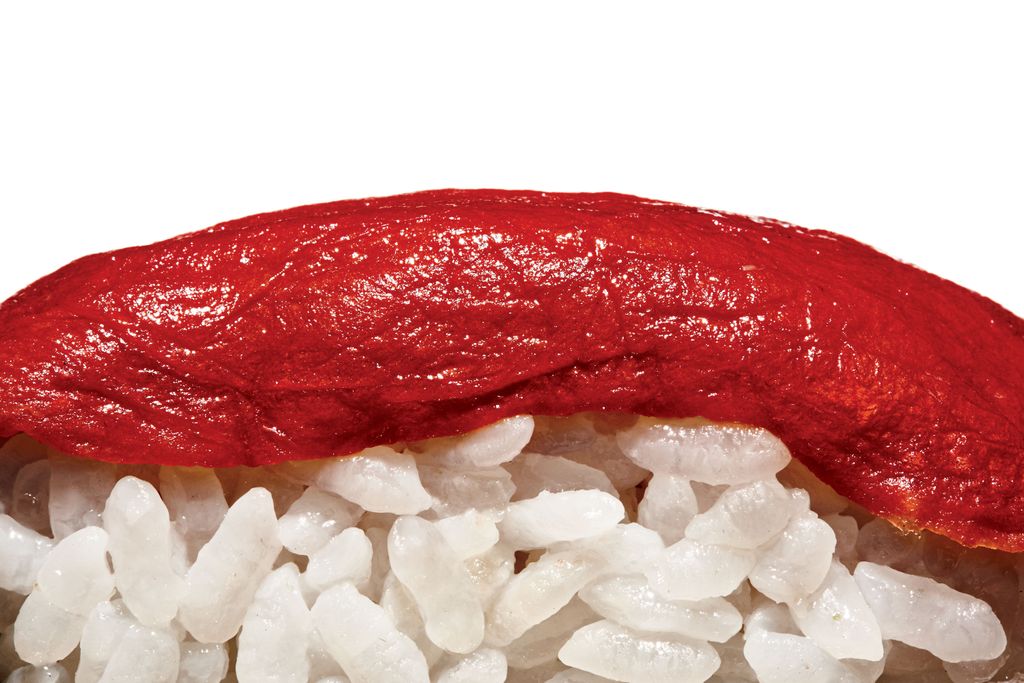
Fish, Fishless
Now that plant scientists have proved that burgers are possible, fish might be the next frontier. Beyond Sushi enlivened the staid subcategory of vegetable sushi with a globally inspired vegan menu mixing multigrain rice with fruits, vegetables, and sauces. Then came Tomato Sushi — recently rebranded as Ahimi by manufacturer Ocean Hugger Foods — which aims to displace ahi tuna with plum tomatoes flavored with soy sauce and sesame oil (find it at Whole Foods Market and the Canal Street Market branch of Fresh & Co.). Next up for chef-founder James Corwell: eggplant eel and carrot salmon. California-based Sophie’s Kitchen, a sort of Mrs. Paul’s of the plant-based-seafood world, was founded in 2011 by Columbia MBA Eugene Wang and influenced by his Taiwanese family’s Buddhist-vegetarian background. The company transforms ingredients like pea protein and konjac, an Asian root vegetable, into crab cakes, shrimp, and cans of VeganToona (at Orchard Grocer). Elsewhere in the freezer case, the British Columbia company Gardein also makes an estimable fishless Filet-o-Fish. And San Francisco start-up New Wave Foods molds shrimp from plants and algae and distributes them through food-service channels, with national retail sales slated for late next year.
G
Gary
The Facebook campaign to rebrand fake cheese.
When a dyspeptic English cheese aficionado heard about a supermarket’s plans to introduce a line of vegan “cheese” made from coconuts, she posted a blistering Facebook rant decrying the act. Why not “call it Gary or something,” because coconuts are not cheese? was the thrust of her argument. “Why not, indeed,” was the collective vegan response from the internet. Now there’s a Facebook page called “It’s not vegan cheese, it’s Gary” and a change.org petition to officially designate all vegan cheese by that name. Sainsbury’s, the supermarket in question, has already taken steps in that direction, rebranding its own line of coconut cheese as Gary. So get ready for grilled Gary, macaroni ‘n’ Gary, and Philadelphia Gary-steaks.
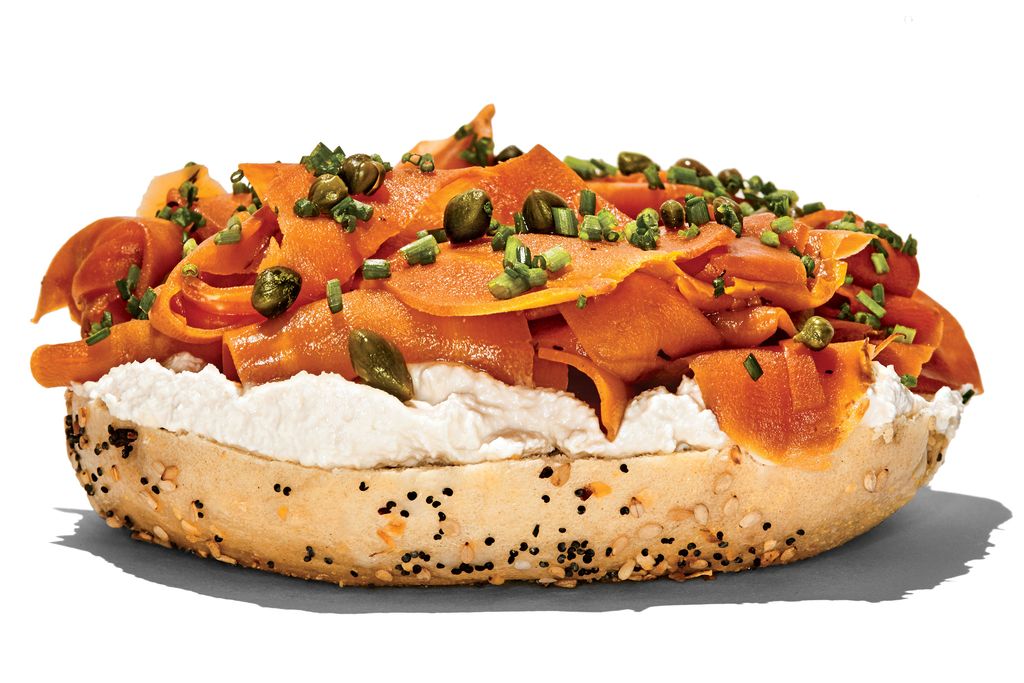
Groceries, 100 Percent Vegan
Health-food stores are nothing new for New York (and other pockets of the progressive-leaning world). But strictly vegan shops are, and the city has seen an influx over the past few years. Think of them as plant-based bodegas (minus the actual plants, oddly; for produce, you’ll need the Greenmarket).
Orchard Grocer
78 Orchard St.
Vibe: The vegan Court Street Grocers.
Shopkeepers: Sisters Sara and Erica Kubersky, proprietors of the vegan MooShoes next door and co-owners with Isa Chandra Moskowitz of the vegan restaurant Modern Love.
Inventory: Everything one needs to stock a cruelty-free larder — No Chicken Noodle Soup, sulfur-tinged Indian black salt to give foods that “umami eggy richness,” Danish seaweed caviar — plus a deli serving meat-and-fish-free takes on such sandwich classics as the egg and cheese, the Reuben, the Italian combo, and the bagel and lox, made here from brined-and-smoked carrot slices and cashew cream cheese.
Riverdel
820 Washington Ave., Prospect Heights
Vibe: The vegan Lucy’s Whey.
Shopkeeper: Michaela Grob, who named the place after her rescue dog (River) and shelter cat (Fidel).
Inventory: A showcase of the best plant-based cheeses Grob could source from around the country, plus everything else a proper hostess needs to entertain. The holiday charcuterie platter includes three cheeses, ham and salami, and Regal Vegan’s Faux Gras plus olives, cornichons, almonds, and crostini.
Haymaker’s Corner Store
176 Ainslie St., Williamsburg
Vibe: The vegan Meat Hook.
Shopkeeper: Brad Baker, owner of Champs Diner and co-owner of Screamer’s Pizzeria.
Inventory: Hipster-survivalist grub, from condiments (Holi Aioli; seaweed-based Fysh Sauce) and snacks to frozen Tofurky pizzas. The Deli Land display case houses kimchee potato salad, chik’n salad, all manner of mock meats, and the makings of the store’s signature muffuletta sandwich.
H
Happycow.net
Yelp for vegans.
Before happycow.net, the crowdsourced online restaurant guide launched in 1999 by an American living in India, traveling vegans must have been forced to forage for nuts and berries along the side of the road. Frequently updated listings and smart recommendations for plant-based options at places that aren’t strictly vegan (or even vegetarian) make it a great, inclusive resource.
I
Ice Cream, Nondairy
After decades of often soy- or rice-milk-based inferiority, vegan ice cream has evolved into something even non-vegans can love. This is in large part due to new formulations — like Van Leeuwen’s rich and nutty combination of coconut cream, cashews, cocoa butter, and coconut oil — which lack the roundness of classic French custards but emphasize distinct flavors like a bracing mint chip and a deeply textured banana nut. On the soft-serve side, Chelsea Market’s Pineapple Expressgave Disney World’s Dole Whip a creamy coconut-milk base and Carmen Miranda flamboyance.
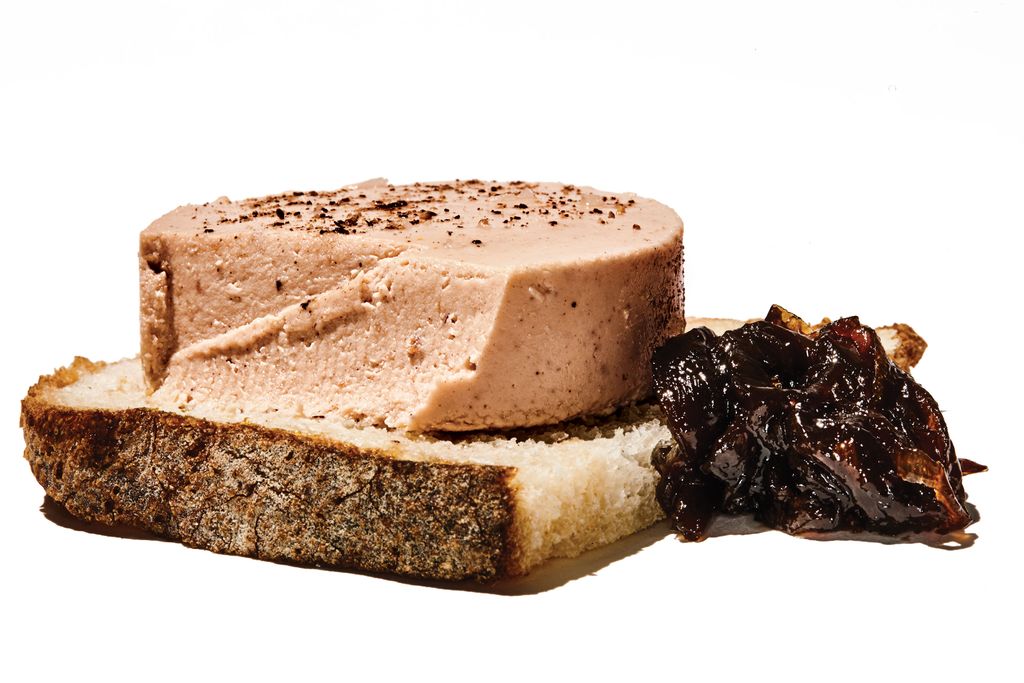
International Vegan
Traditions old and new.
Chinese
Without the Buddhist-monk invention of the original mock meat — mian jin, or wheat gluten — there’d be no Tofurky or wheatballs. Find facsimiles of everything from jellyfish to lamb stew at Buddha Bodai (5 Mott St.).
French
The stronghold of saucisson and Camembert might seem like a vegan’s nightmare. But at Délice & Sarrasin, the escargots are oyster mushrooms and the foie gras is tahini-based (20 Christopher St.).
Indian
Few cuisines are as vegetarian-friendly as Indian, but vegans need to beware the ubiquitous ghee. This is not an issue at the NY Dosas street cart in Washington Square Park, where Thiru Kumar has peddled dairy-free dosas for 16 years.
Italian
In the old country, the meat-starved cucina povera relied on beans, greens, grains, and stale bread. In New York, you’ll find seitan parm and vegan Alfredo on John’s of 12th Street’s separate vegan menu (302 E. 12th St.).
Japanese
Shojin ryori sprung from Zen Buddhist monasteries and influenced kaiseki. At Kajitsu, artful plates combine chrysanthemum petals, ginkgo nuts, and nama fu, Japanese wheat gluten (125 E. 39th St.).
Korean
Korea’s temple-food tradition might be overshadowed by its barbecue, but vegans searching for a balance of yin and yang (um and yang in Korean) will find it, along with todok root and pumpkin porridge, at Hangawi (12 E. 32nd St.).
Mexican
Crema, cotija, and lard can make Mexican treacherous territory for vegans, but at JaJaJa Plantas Mexicana, the chorizo is seitan and the carnitas consist of hearts of palm and jackfruit (162 E. Broadway).
Caribbean
Rastafarians eat fresh, non-processed “ital” foods to enhance Livity, or life energy. Though the menu ranges from faux jerk chicken to “burgers,” there’s a bit of that spirit at Veggie Castle II, a vegan offshoot of the Guyanese restaurant Sybil’s (132-9 Liberty Ave., South Richmond Hill).
Ethiopian
Followers of the Ethiopian Orthodox Christian church abstain from animal products during 208 fasting days a year; diners at the vegan Bunna Cafe can feast on pulses, kale, and the teff-based flatbread called injera all 365 (1084 Flushing Ave., Bushwick).
J
Jackfruit
The other white meat.
Reputed to be the largest fruit in the world, weighing in at up to 100 pounds, which might be why when mock-meat entrepreneurs look at a jackfruit, they see a snout-nosed mammal and the potential for pulled pork. It’s traditionally used in curries and stir-frys in Indian cooking; you can also find it at vegan restaurants, typically drenched in barbecue sauce and served on a soft roll.
L
Liquid Smoke
Where there’s liquid smoke, there’s … fake meat.
A substance produced by capturing the vapors from burning wood (usually hickory) in a still or condenser. The resulting liquid is used as a quick and easy flavoring agent in more things than you may have imagined, including not just barbecue meats and sauce, but everything from cheese to potato chips. It was designed and marketed in the late 1800s as a preservative for hams, but its chief purpose eventually became adding smoky flavor to ribs and briskets without having to actually go to the trouble of smoking them over a wood fire. Barbecue purists despise the stuff, finding its flavor insipid, and its use a form of blasphemy. So it’s funny, or rather, fitting, that vegans have taken to it like cats to catnip. It’s big in seitan circles and fake-bacon-makers swear by it. (See “Meats, Mock.”)
M
Meats, Mock
Taste-tested.
You’ve got to give the folks who make mock meats a little credit. Trying to produce a hot dog from a carrot or some tapioca or whatever cannot be easy. Imagine if the situation were reversed and someone was tasked with conjuring, let’s say, a potato, from a pork chop. Just think what it would be like to try to create a reasonable facsimile of a banana from a slab of tofu, or a veggie bowl from some vital wheat gluten and a bunch of chicken wings. That is not unlike the challenge these mock-meat magicians face. Their efforts may perpetually fall short, and their handiwork may always be looked askance at by carnivores, but that doesn’t mean it can’t be delicious in its own right. Here, ten meatless meats even an omnivore might like.
Pastrami, The Herbivorous Butcher
Well, it isn’t Katz’s. The packaged slices made from seitan are round and reddish-brown and have a slightly spongy-soft mouthfeel, which is to say the texture is way off. But the robust spicing (heavy on the black peppercorn and helped along with the cheats of nutritional yeast and liquid smoke) is impressively pastramilike. Slap it on rye, add some sauerkraut and non-dairy cheese, griddle the sandwich in coconut oil, slather with Russian dressing, serve it with a pickle on the side, and you have a pretty tasty vegan Reuben ($11 at Orchard Grocer).
Korean BBQ Ribs, The Herbivorous Butcher
Unlike its pastrami, the Herbivorous Butcher’s barbecue ribs — thick, weighty little logs of seitan — look remarkably like the real thing. A gathering of Korean grandmothers would be hard-pressed to identify them as impostors based on looks alone. As good and good-looking as they are, we have to dock points for texture: smooth and dense instead of chewy-stringy. It encourages you to go at them with knife and fork instead of picking them up with your fingers, which is about the most un-riblike thing you can do to a rib ($15 at Orchard Grocer).
Hot Dogs, Yeah Dawg!!!
There’s no snap, and the mushy texture reminds us of kishka. But we like these vegan wieners for their smoky, spicy, garlic-forward flavor. So does restaurant man Joe Bastianich, who is such a fan he ran them as a special at Eataly’s vegetarian restaurant, Le Verdure. They’re made in Brooklyn by Marina Benedetto from a soy-free mishmash of potatoes and sweet potatoes, beets, carrots, and sunflower seeds ($12 for a four-pack at Orchard Grocer).
Holiday Roast, Gardein
Tofurky upstart stuffed with kale, cranberry, and wild rice, shaped like a bûche de noël and thoroughly breadcrumbed on the outside, giving it the appearance of a supercolossal chicken cordon bleu, or a giant mozzarella stick. Yes, there’s a layer of unoffensive fake turkey in there, but essentially it’s stuffing on stuffing, and who doesn’t love extra stuffing ($15 at Whole Foods)?
Chili Lime Carnitas, Upton’s Natural
The claim: Tropical jackfruit when young and green bears a striking resemblance to meat. (See “Jackfruit.”) The verdict: The texture is more like a combination of artichoke and hearts of palm. Which is not to say that when fried in a pan and stuffed into a warm tortilla it isn’t tasty ($6.59 at Orchard Grocer).
Coconut Bacon, Phoney Baloney’s
Salty, crunchy, greasy oven-dried bits and flakes of coconut flavored with maple syrup and liquid smoke that split the difference between sweet and spicy. You sprinkle them on salads, sandwiches, veggie bowls, and so on, or gobble them straight out of the pouch like a bag of Doritos ($16 for three packs at phoneybaloneys.com).
Meatless Meatballs, Trader Joe’s
These tiny spheres of soy about the size and shape of chocolate-covered cherries are soft but not mushy, good enough when baked for ten minutes on a sheet tray, better simmered in tomato sauce. They wouldn’t fool a Sicilian-meatball maven for a second, but you can’t beat the price: $4 per frozen pack of 30 — an impressively frugal 13 cents per soyball.
Seitan, Blackbird Foods
Sure, it looks like a dirty old sponge that’s been run through a paper shredder, but that’s kind of the point with seitan (wheat gluten) — its ability to serve as a blank canvas and soak up whatever sauce or liquid it comes in contact with. This heat-and-eat brand, a collaboration between the Philadelphia vegan pizzeria Blackbird and the New York vegan fast-food chain Terri, is the best we’ve tried, with a squeaky bite like a morel. Plus, it’s made locally, in Long Island City ($6 at Orchard Grocer).
Soy Curls, Butler
The selling point for these dehydrated, texturized soy pieces is that they’re made from whole, non-GMO soybeans, and therefore better than the often highly processed competition. According to the website, they work in just about any recipe that calls for a chewy-tender strip of faux flesh, including chicken salad, and we can vouch for the veganized trippa alla romana we devised, with the spongy stuff being convincingly tripelike ($20 for six eight-ounce bags at butlerfoods.com). The Butler brand sister product, Sam’s Harvest Soy Jerky, is made from spiced-up Soy Curls, and texture-wise reminded us of the rubbery magic mushrooms we ate one time in college, though it tasted a lot better ($6 at Orchard Grocer).
N
Nooch
Common nickname for nutritional yeast, the deactivated, fortified yeast (not to be confused with yeast extract, like Marmite) that can be found anywhere vegans want to administer an extra dose of cheesy, tangy flavor, from popcorn to pizza. Some consider it a culinary crutch, not unlike MSG at Chinese takeouts or the Italian-American kitchen’s grated parm. At Screamer’s Pizzeria, they put it in a glass shaker next to the garlic powder and chile flakes.
P
Pet Food
Kibble minus the beefy bits.
Yes, dogs, like their owners, can be vegan. Plant-based pet-food brands like PetGuard and Evolution Diet are designed for the pooch who wants to lead a meat-free lifestyle. And a company named Vegedog provides DIY pet owners who whip up their own vegan dog food recipes with the necessary supplements to ensure a proper balance of nutrients. But is it right to deny Fido his meat? The argument in favor: Why not? The commercial production of pet food comes with the same ethical, environmental, and health dilemmas associated with factory-farmed beef, pork, and chicken. The opposing point of view: There aren’t any definitive studies that prove a meat-free diet is healthier for dogs. As for cats — obligate or “true” carnivores, as opposed to naturally omnivorous dogs — the science is more controversial.
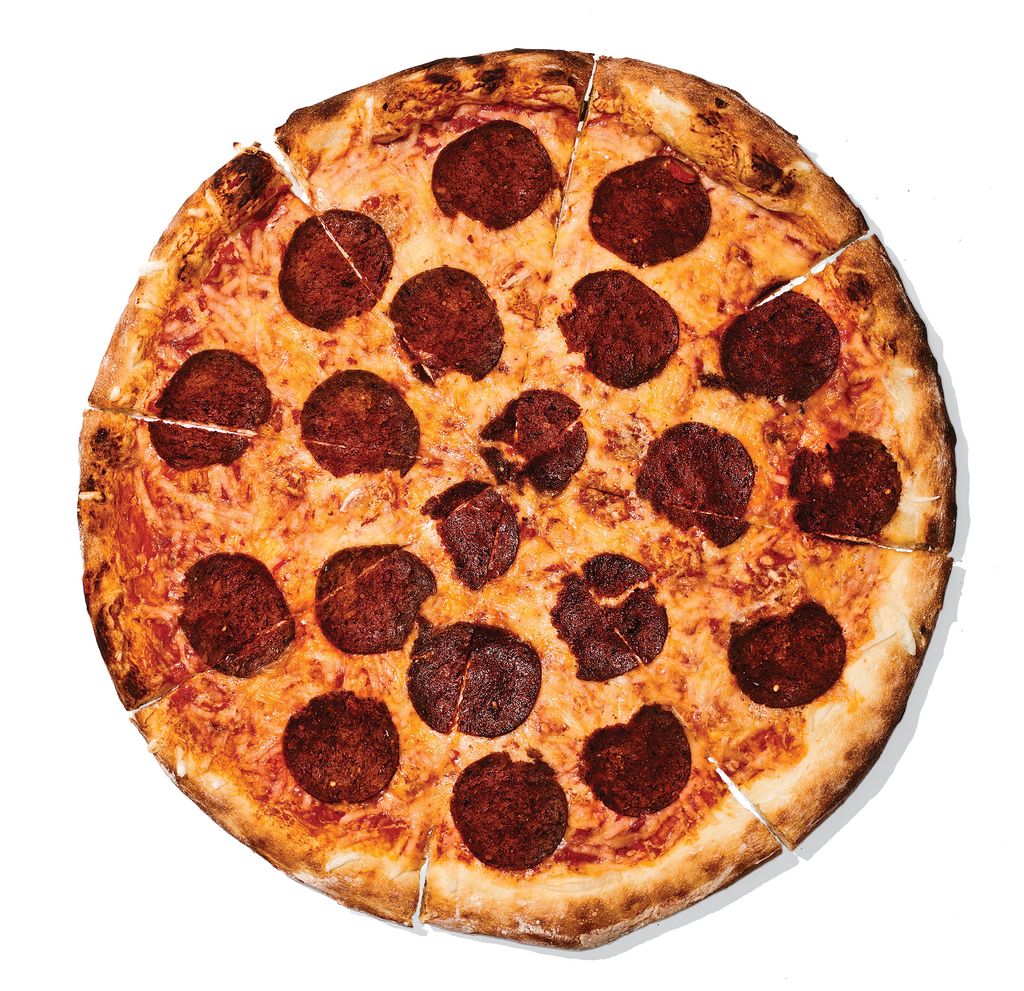
Pizza, in Greenpoint
Dairy-free pies like the inherently vegan Neapolitan pizza alla marinara are all well and good, but the allure of the cheese pizza is just too powerful for some vegan wannabes to resist. Which is why a pair of Canadians invented dairy-free Daiya Mozzarella-Style Shreds to not a little acclaim a few years back. As much of a breakthrough as Daiya was, vegan-pizza connoisseurs thought there was room for improvement. And so, more faux cheesemakers and pizzaioli keep coming up with alternatives, many of which can be sampled in a corner of North Brooklyn that’s suddenly become a vegan-pizza hot zone.
Screamer’s Pizzeria
620 Manhattan Ave.
The first and only all-vegan slice joint in New York, a collaboration between the owners of Champs Diner and Philadelphia’s Blackbird Pizzeria. Most pies get topped with Violife mozzarella, a brand from Greece made of coconut oil and potato and corn starches that melts a bit like the American processed stuff and has a mild, milky flavor. For its Margherita, bianca, and Grandma pies, Screamer’s uses the superior Numu, the hot new vegan mozzarella, also made from coconut oil (and soy), but in Brooklyn if you’re counting food miles. Still, the best slices we tried were a seitan pepperoni and a droopy Buffalo cauliflower with a drizzle of housemade faux-ranch dressing, both topped with Violife.
Adelina’s Fraschetta Romana
159 Greenpoint Ave.
Largely vegetarian-and-vegan trattoria opened five years ago by Roman expat Toby Buggiani. Initially, Buggiani used Daiya mozzarella on his vegan pies. That lasted a week. Now he makes his own cultured cashew mozzarella that is surprisingly good — sweet, milky, tangy, and, er, nutty. The pizza is cooked in the Neapolitan montanara style: flash-fried in a deep fryer, then topped and baked.
Paulie Gee’s
60 Greenpoint Ave.
A third of the pies are vegan at Paul Giannone’s Neapolitan-style pizzeria. Like Adelina’s Buggiani, Giannone had a brief flirtation with Daiya, and early on he made his own cashew ricotta. Recently, he entered into a relationship with Numu mozzarella and is currently very happy. The Jackie Green pizza (jackfruit meatballs and Numu) and the Popeye’s Pumpkin Pie (baby spinach and dollops of housemade pumpkin-cashew ricotta) are standouts.
Sizzle Pie
457 Graham Ave.
This Portland, Oregon, heavy-metal-happy import has two Williamsburg outposts, one close enough to the Greenpoint border to be included here. Vegan pizza makes up a quarter of the menu. There’s a choice between Daiya mozz and Follow Your Heart, a well-regarded brand from the L.A.-based manufacturer of Vegenaise. You can also add dollops of “Not-a-Ricotta” or tofu cheese, and to promote sampling, all slices can be had by the half-slice “cut.” Truth be told, on a recent visit, our favorite was actually the cheeseless Spiral Tap, a pissaladière-like combo of creamy caramelized onion, red sauce, and nutritional yeast.
Plant Based Foods Association
The vegan-food lobby.
The beef, pork, and poultry lobbies take no prisoners in Washington, so why not expect the same from the booming category of meats and cheeses made from things like vital wheat gluten, pea protein, and soy? That’s the thinking behind this recently formed advocacy group. Sample pet project: fighting the Dairy Pride Act, a piece of legislation that would quash a producer’s right to call a hunk of faux fromage made from, say, cashews, coconut oil, and tapioca starch “cheese.”
Protein, Pea
The new soy.
The soluble stuff extracted from yellow split peas has a higher protein content than that found in eggs, milk, and almonds. It’s sustainable and doesn’t have the allergen problems associated with gluten or soy. It’s been predicted that the market for pea protein will be worth $34.8 million by 2020. In short, the little legume is the biggest thing in vegan food circles since Chloe Coscarelli. (See “Scandals.”) Find it in everything from Ripple alt-milk to Just Mayo to the Beyond Foods burger, the tasty rival to the Impossible Burger, available at Whole Foods.
R
Restaurants, Best
Find all the best vegan and vegan-friendly restaurants here.
S
Scandals
From buybacks to boycotts.
1994: Dan Hoyt, co-founder of raw-vegan forerunner Quintessence, is first arrested for public lewdness at the 8th Street subway station — and again in 2005, and in 2008, and as recently as 2016.
2014: The too-convincing Just Mayo is sued by Hellmann’s parent company for impersonating an egg-based condiment. Two years later, the SEC investigates the company for accusations of inflating sales figures with product buybacks.
2017: Pure Food & Wine co-founder Sarma Melngailis pleads guilty to fraud and theft after going on the lam with her ex-con husband and getting busted after he ordered a (non-vegan) pizza from Domino’s.
2017: Two years after its launch, fast-casual juggernaut By Chloe jettisons founding chef and namesake Chloe Coscarelli when she fails to secure control of the company in a suit against partner ESquared Hospitality.
2017: Canadian vegan cheesemaker Daiya sells out to Otsuka Pharmaceutical Ltd., a Japanese company that uses animals in laboratory testing, for $325 million. Vegan shops including Orchard Grocer pull Daiya’s faux mozzarella off the shelves.
Smorgasburg for Vegans
Part raucous vegan feeding frenzy, part pop-up showcase for vegan-foods entrepreneurs, the six-year-old Vegan Shop-Up is held once a month, usually at the Pine Box Rock Shop bar in East Williamsburg. If you’re thinking fresh fruit and vegetables, think again. On a recent Saturday afternoon, the overriding theme seemed to be “Junk Food, It’s Not Just for Omnivores Anymore.” Sample dishes from various stands: Monk’s Meats mesquite-smoked seitan sandwiches, Orchard Grocer’s veganized Monte Cristos, Freakin’ Vegan’s buffalo mac ’n’ cheese, and Peaceful Provisions’ croissonut (a doughnut-croissant filled with sweetened Tofutti cream cheese, smeared with Tofutti cream-cheese icing, and finished with everything-bagel spices). The single best bite, in case you’re wondering, went to Gone Pie’s deliriously good salted-peanut-butter-caramel cup.
Superiority Wrap, né Hippy Wrap
The name Brooks Headley, former Del Posto pastry chef and chef-owner of Superiority Burger, eventually gave to a vegan item on his menu consisting of tofu, cabbage, fancy brown rice, and candied sunflower seeds wrapped in a whole-wheat tortilla. At first, he called this concoction a Hippy Wrap and was surprised to learn that the typical Superiority Burger customer wouldn’t eat a Hippy Wrap if you paid her to. When he realized that the association between hippies and sad, tasteless food is deeply ingrained and changed the name of the menu item to Superiority Wrap, they started selling like hot cakes. Sorry, hippies.
Sweets, Omnivore-Approved
If you need proof that the vegan life isn’t one of total deprivation, look no further than your local vegan bakery. Cane sugar, after all, is vegan, as are its equally plant-based cohorts: agave syrup, maple syrup, molasses, coconut sugar. (Only honey’s verboten, since it’s the exploitive product of bee labor.) Here, five standouts:
Confectionery!
440 E. 9th St.
East Village outpost of two cult New Paltz brands: Sweet Maresa’s, which has solved the ancient riddle of how to make macarons without egg whites, and Lagusta’s Luscious, the feminist chocolatier creator of the Furious Vulva bonbon and the better-than-Snickers Turtle Bar.
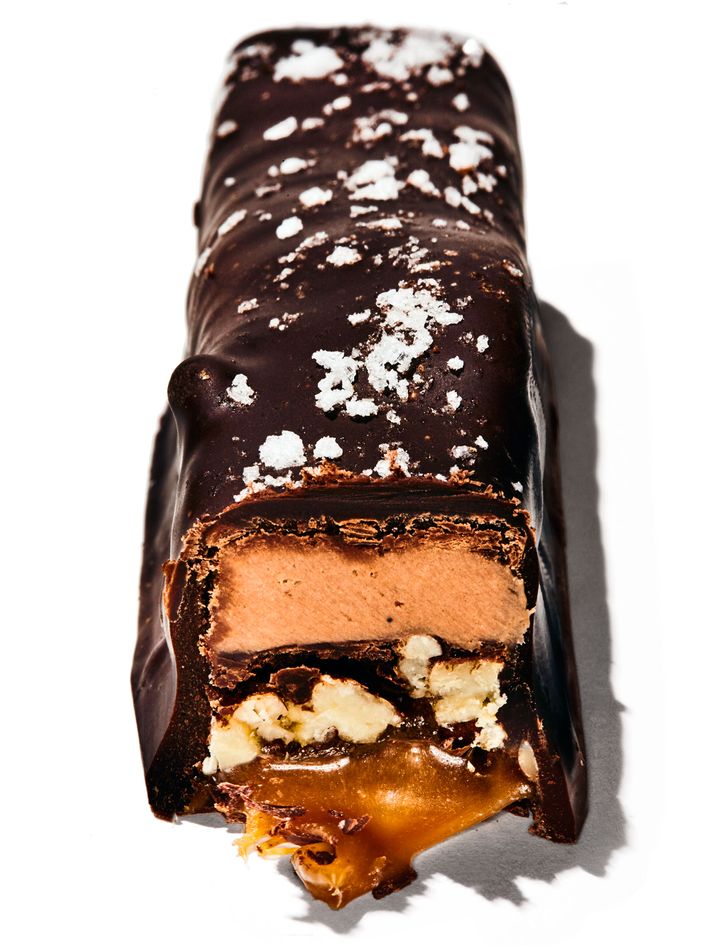
Dun-Well Doughnuts
222 Montrose Ave., East Williamsburg; 102 St. Marks Pl.
The setting is ye olde apothecary, the soft-serve ice cream is made from cashews, and the crowd favorite among the daily-changing flavors is PB&J.
Fine & Raw
288 Seigel St., East Williamsburg
Raw vegan chocolate manufactured and sold in a factory around the corner from Roberta’s. Go for the thick mini-bars called “chunkies” and the outlandishly delicious chocolate-hazelnut butter.
Erin McKenna’s Bakery
248 Broome St.
The seminal Lower East Side shop formerly known as BabyCakes made vegan (and gluten-free) cupcakes a thing, and has since expanded into bagels — not to mention the Orlando and L.A. markets.
Brooklyn Whiskers
760 Bushwick Ave., Bushwick; 1008 Manhattan Ave., Greenpoint
When Champs closed its Bushwick bakery, a former employee converted it into this source for vegan viennoiserie (croissants and doughssants), cinnamon rolls with candied pecans, and old-fashioned doughnuts; a second outpost opened recently in Greenpoint.
V
The Vegan Cordon Bleu
For 40 years, the Flatiron’s Natural Gourmet Institute has functioned as a local-and-seasonal-inspired, plant-based incubator for some of the country’s most influential vegetarian and vegan chefs, including Dirt Candy’s Amanda Cohen; Chloe Coscarelli, formerly of By Chloe; and Tal Ronnen, of Crossroads in L.A. And as part of their training, students cook a weekly meat-free Friday-night supper for the paying public.
Vegan on Wheels
Street meatless.
Struck with messianic fervor to bring the cruelty-free lifestyle to the masses, Adam Sobel is credited with launching the city’s first organic vegan food truck, the Cinnamon Snail, which debuted in Hoboken in 2010. After tiring of the mobile-restaurant world’s headaches (black-market permits, daily parking tickets, mechanical breakdowns), he can now be found dispensing maple-mustard tempeh sandwiches and gateway vegan doughnuts to Wall Streeters and commuters at FiDi’s City Acres and the Pennsy at Penn Station.
Vegans, Types of
Ethical vegans abstain from all animal-derived foods, including meat, fish, fowl, eggs, dairy, insects, honey, etc., for moral reasons; nor do they use animal products, like leather shoes or fur hats.
Dietary vegans, a.k.a. healthy vegans, avoid eating animal-derived foods, subsisting primarily on a plant-based diet for the presumed health benefits.
Raw-food vegans are dietary vegans who abstain from animal-derived foods and any food cooked past a temperature of 118 degrees Fahrenheit.
Environmental vegans don’t eat animal-derived foods because they view factory farming as unsustainable and doomed and environmentally devastating.
Part-time vegans, a.k.a. fair-weather vegans, are dietary vegans but only occasionally, like from nine to five during the week.
Junk-food vegans are ethical vegans and/or environmental vegans who couldn’t care less about what they eat, may never have forked down a kale salad in their lives, and subsist mainly on a diet of highly processed mock meats and things like Buffalo Chik’n pizza, veganized Philly cheesesteaks, French fries, and cigarettes.
Straight-edge vegans, a subcategory of ethical vegans named for a 1981 song by punk band Minor Threat, also abstain from cigarettes, alcohol, drugs, and meaningless sex.
Vintners, Vegan
“Vegan wine” refers to how or whether a wine is fined, meaning the process by which unwanted particles that make it cloudy and affect flavor are removed during the winemaking process. Fining agents are often made from animal products like fish bladders, egg whites, milk protein, and gelatin. To be considered vegan, a wine is either unfined, as is common with natural wines, or fined with non-animal substances like bentonite clay. Bottle labels are not required to list fining agents, but some winemakers and restaurants have started identifying vegan wines on labels and menus, and a growing selection can be found on the online database barnivore.com.
*A version of this article appears in the November 13, 2017, issue of New York Magazine.
